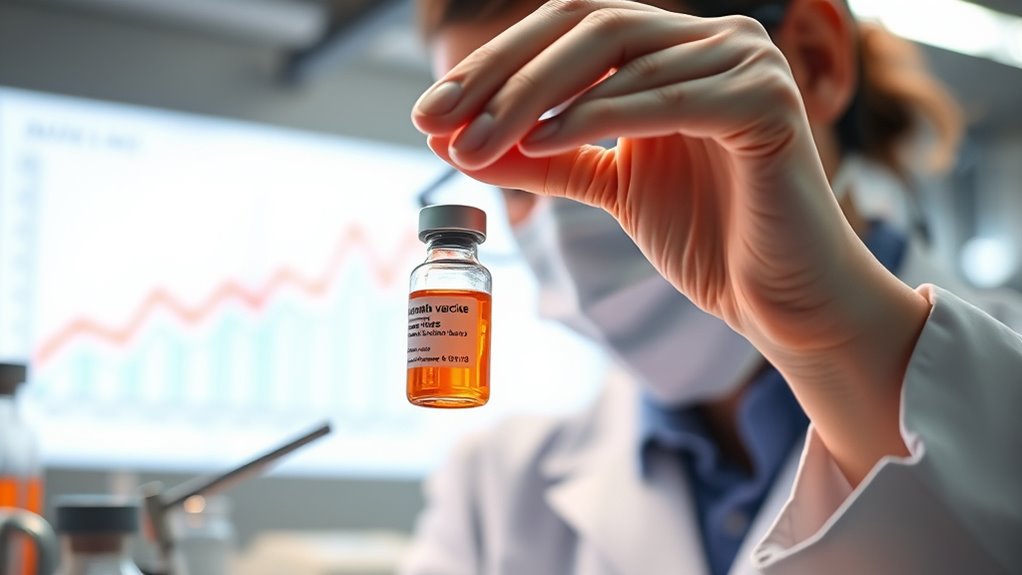Recent early trials show that a fentanyl vaccine can effectively prevent the drug from reaching your brain, blocking the intense euphoria and reducing overdose risk. This promising development uses immune responses to target fentanyl molecules, making it harder for users to experience its effects. While the vaccine isn’t meant to replace treatment, it offers a new tool to support recovery and harm reduction. Keep exploring to understand how this breakthrough could impact addiction and public health efforts.
Key Takeaways
- Early clinical trials show promising immune responses and reduced fentanyl effects among participants.
- The vaccine effectively generates antibodies that block fentanyl from reaching the brain.
- Results indicate potential to lower overdose risks and support addiction treatment efforts.
- Advances in formulation improve vaccine longevity and immune response strength.
- Researchers are exploring new delivery methods to enhance effectiveness and accessibility.

As fentanyl addiction continues to pose a severe public health crisis, researchers are exploring innovative solutions like vaccines to combat it. One promising approach involves immunotherapy development, where a vaccine is designed to trigger your immune system to recognize and neutralize fentanyl before it reaches your brain. This strategy aims to reduce the drug’s euphoric effects, helping individuals avoid relapse and overdose. Early trials of such vaccines have shown promising results, indicating they could be a game-changer in addiction treatment. By preventing fentanyl from crossing the blood-brain barrier, the vaccine fundamentally blocks the high and diminishes the drug’s reinforcing properties. This has significant public health implications, as it could lower overdose deaths and support long-term recovery efforts.
Fentanyl vaccines could reduce overdose deaths by blocking the drug’s effects before reaching the brain.
The development process involves creating a molecule that prompts your immune system to produce antibodies specifically targeting fentanyl. When someone with fentanyl addiction receives the vaccine, their body begins to generate these antibodies, which then bind to fentanyl molecules if they are used. This prevents fentanyl from entering the brain, reducing the drug’s ability to produce euphoria. Because of this mechanism, the vaccine doesn’t eliminate the need for other treatments but complements existing therapies by decreasing the risk of relapse triggered by fentanyl exposure. Additionally, ongoing research into immunotherapy strategies continues to improve the effectiveness and longevity of these vaccines. Researchers are also exploring targeted immune responses to enhance the vaccine’s protective capabilities and duration. Advances in vaccine technology are helping to create more effective formulations that could provide longer-lasting protection. Understanding the immune system’s role in addiction can further optimize vaccine development. Furthermore, insights from fiber-based delivery methods are being investigated to improve vaccine stability and administration efficiency.
Public health implications of this development are profound. With overdose rates soaring, especially among vulnerable populations, a vaccine could serve as a critical tool in harm reduction strategies. It offers a proactive approach, potentially decreasing emergency room visits, hospitalizations, and fatalities. Furthermore, it can alleviate some of the societal burdens associated with addiction, including crime and economic costs related to healthcare and lost productivity. However, it’s crucial to recognize that vaccine development isn’t a one-size-fits-all solution. Ongoing research aims to improve its efficacy, duration, and accessibility, ensuring it can be integrated into extensive addiction treatment programs.
While still in the early stages, these vaccines have the potential to revolutionize how we approach fentanyl addiction. Their success would mark a significant advance in immunotherapy development, providing a new layer of protection for those struggling with opioid dependence. As the scientific community continues to refine and test these vaccines, the hope is that they will become an essential part of our public health arsenal, helping to curb the devastating toll of fentanyl addiction on individuals and society alike.
Frequently Asked Questions
How Long Does the Vaccine’s Protection Last?
You’re probably wondering about the vaccine’s duration and immunity longevity. Currently, early studies suggest that the vaccine offers protection for several months, but the exact duration can vary based on individual responses and booster shots. Ongoing research aims to determine how long the immunity lasts and whether additional doses are needed. Keep in mind, as this is still in early trials, so more data will clarify how long you’ll stay protected.
Are There Any Side Effects From the Vaccine?
So, you’re wondering about vaccine side effects? Well, you might experience some mild adverse reactions like soreness at the injection site, fatigue, or a slight fever—nothing too dramatic. Of course, serious adverse reactions are rare, but it’s always wise to stay alert and chat with your doctor if anything unusual pops up. Remember, the benefits often outweigh the side effects when fighting a serious problem like fentanyl addiction.
Who Is Eligible to Receive the Vaccine?
You’re likely eligible for the vaccine if you’re at high risk for fentanyl addiction or have a history of opioid use disorder. The eligibility criteria typically include being within certain age groups and meeting specific medical or behavioral health conditions. The vaccination schedule usually involves multiple doses over several weeks. Consult your healthcare provider to determine if you qualify and to get personalized guidance on the vaccination process.
Can the Vaccine Prevent Overdose Entirely?
You might wonder if the vaccine can prevent overdose entirely. While it shows promise, long-term efficacy remains uncertain, and ongoing studies are necessary. It may reduce overdose risk markedly, but it isn’t a guaranteed shield. Ethical considerations also come into play, such as informed consent and access. Ultimately, the vaccine could be a powerful tool, but it’s best seen as part of an all-encompassing approach to addiction treatment and overdose prevention.
How Does the Vaccine Work at the Biological Level?
You might wonder how the vaccine works at a biological level. It stimulates your immune response by teaching your body to recognize fentanyl as a threat. The molecular mechanism involves the vaccine triggering the production of antibodies that bind to fentanyl molecules, preventing them from reaching your brain. This process effectively blocks the drug’s effects, helping reduce addiction and overdose risks by neutralizing fentanyl before it can cause harm.
Conclusion
This new vaccine offers hope like a beacon in the fog, guiding those lost in addiction toward a brighter future. By reducing fentanyl’s grip, it empowers you to reclaim control over your life. Early trials show promise, and with continued support, this breakthrough could be the key to opening a drug-free tomorrow. Stay hopeful—sometimes, the darkest night is just before dawn, and this vaccine might be the sunrise you’ve been waiting for.









